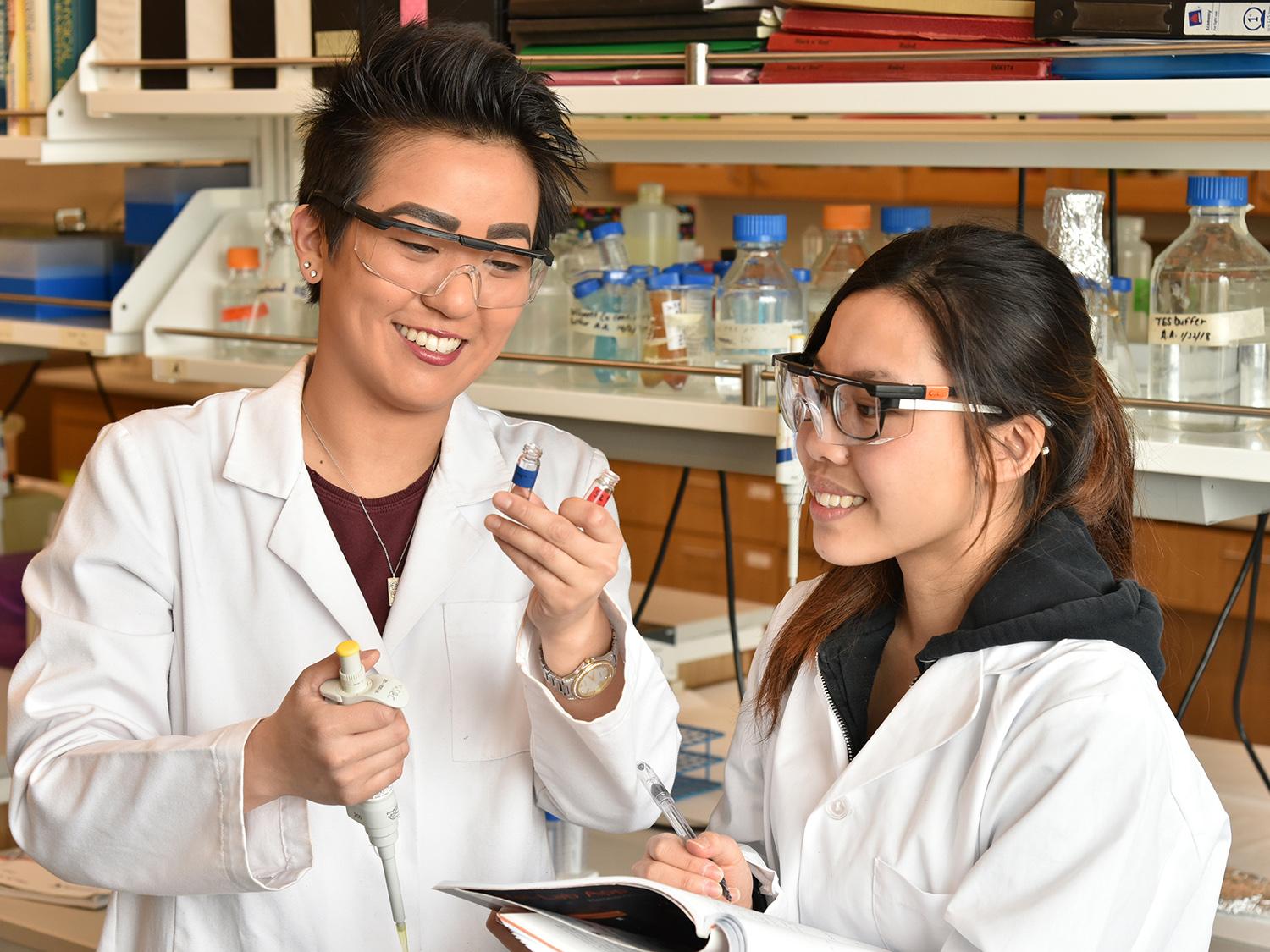Seeking a link -- Biochemistry majors Kaitlyn McCue (left), a senior, and Christina Li, a junior, work in a Shineman Center biochemistry lab. At the annual Quest symposium on April 4, the two will present their research on a correlation of mosquito-borne diseases -- dengue, chikungunya and zika -- and patient markers for stress preceding illness.
Biochemistry majors Kaitlyn McCue and Christina Li will present at the college's annual Quest symposium Wednesday, April 4, their research on a correlation of mosquito-borne diseases -- dengue, chikungunya and zika -- and patient markers for stress preceding illness.
Quest, the college’s annual daylong celebration of student, faculty and staff scholarly and creative activity, invites the campus and community to attend free panels, presentations, readings, a poster session and more.
McCue, a senior and resident of Hopewell Junction, and Li, a junior from Brooklyn, sought to determine whether hair cortisol levels in patients with dengue, chikungunya and zika in Machala, Ecuador, show a correlation with stressors such as an earthquake in April 2016 that killed more than 650 people in the South American country, with months of aftershocks. A major epidemic of zika came on in the quake's wake.
"Machala was chosen because it was previously determined to be a hotspot for these three diseases,” McCue said.
“Cortisol is a hormone that is related to level of stress,” Li said. “By extracting cortisol from hair, we can get a long-term analysis of the amount of stress a person experiences in the past few months (since hair, on average, grows about 0.4 inches per month).”
McCue and Li expect significantly different cortisol levels for those under more stress and with more severe forms of the disease in mosquito-prone tropical regions, such as Ecuador. The devastating earthquake in Ecuador may have made people's immune systems more vulnerable to the diseases, they theorize.
The pair's research advisor, Dr. Kestutis Bendinskas of SUNY Oswego’s chemistry faculty, worked on this study for half a year before passing it on to his students, who “did all the bench work for the project,” he said.
‘Rigorous standards'
McCue made a successful grant proposal to the college’s Scholarly and Creative Activity Committee, funding her and Li’s research and enabling them to complete the study.
Once they received samples from their collaborators in Machala, “the hair samples were prepared and subjected to a series of chemical incubations,” McCue said. “The samples were then dried via nitrogen stream evaporation. After completing the preparation and extraction of all hair samples, enzyme-linked immunosorbent assay (ELISA) was performed to quantitatively determine the amount of cortisol in each hair sample.”
The researchers hope to bring their study, "Hair cortisol concentration in patients with tropical mosquito-borne diseases in Machala, Ecuador," to the public. “Hopefully we will publish a paper on our research. If this paper is published, then it will be available to anyone,” McCue said.
“The research has taught me to think critically and learn about the laboratory procedures,” Li said. “These hands-on experiments have allowed me to apply what I've learned from class and from literature research to really appreciate the science behind each technique. From this project, in particular, I learned important problem-solving skills when creatively thinking about ways to overcome obstacles.”
Li hopes to continue doing research that has a significant impact, such as this study, as an undergraduate in Oswego and later in graduate school.
Bendinskas said both Li and McCue worked long hours for many days in a row to perfect the experiments. “The quality of their work is that of the most rigorous national standards. Students' effort during academic breaks inspires me in the excellent future of science in the U.S.,” he said.
McCue has just been accepted to a doctoral program and Li has been selected for a summer research program prior to her senior year. “I cannot be more proud of these two young ladies,” Bendinskas said.
The researchers are awaiting significant results and complementary data from Syracuse University.
Centered in Marano Campus Center, the Quest symposium will take place from 9 a.m. to 5 p.m. Wednesday, April 4, in various campus venues. For more information and a schedule, visit oswego.edu/quest.
The event is free and open to the public, there are no classes April 4 and parking on campus is free that day.




